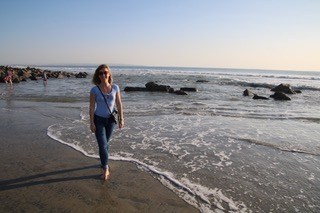By Diana Mosonyi
A friend of mine came up with the term “ombuds tourist” when I was telling her about my attempt to visit as many ombuds offices in the US as I could. Between November 2017 and February 2018, I took up the quest to find an answer to a seemingly simple question: Why is working in an office where people bring their anger, frustration, despair, bitterness, and tears so attractive? I’d like to share my journey with readers of The Independent Voice, as I believe they might find it interesting and useful as they consider their work as ombuds or paths to the profession.

My Journey
My journey truly began in January of 2014 in Hungary when I started my master’s degree in leadership and management, specializing in organizational mediation. It was like love at first sight. I took two mediation classes every semester for those two years, and each time I became more committed to mediation. The topic of my master’s thesis was project mediation, and my hypothesis was that the success of a project depends on hidden conflicts. Based on my analysis of interviews I conducted for that project, I concluded that use of mediation techniques would significantly reduce the harm of potential conflicts and project damages. This caught some attention even in Hungary where, maybe due to history, people do not trust that any third party can be impartial and neutral. Consequently, the recommendation in my thesis was that project managers should improve mediation skills.
During my graduate studies, I learned about the Julius Rezler Foundation, which supports Hungarian students to study abroad in the United States. I applied and won the scholarship in 2017. Winning the scholarship made me the happiest person in the world because my two dreams came true at the same time: to learn more about mediation and to better understand American culture. I am very grateful for the scholarship which allowed me to study alternative dispute resolution at the University of New Mexico (UNM). During my studies at UNM, the mediation instructor, Anne Lightsey, was kind enough to introduce me to the Ombuds Office. Participating in her class was one of the best training experiences I have had. She created the safest atmosphere during the training, with her attitude and competence, and demonstrated her good and bad experiences with a lot of examples. As a result, everybody felt safe enough to try it themselves and make mistakes.
After finishing my semester at UNM, I went back to my home country with the aim to find out how an academic ombuds office works. That was when one of my professors recommended a Hungarian competition that focused on alternative dispute resolution. He convinced me to apply to this competition because of my American experience. I wrote a study of conflict resolution with the Ombuds Office where I described the U.S. academic ombuds system in comparison to the Hungarian ombuds system. In Hungary, we mostly use classical ombudsmen who are “typically appointed by a legislative body to represent the public with concerns of the public with regards to the conduct of governmental agencies; they conduct formal investigations.”[1] I won the first place at Hungarian Financial Arbitration Board Arbitration competition in 2017. After that, I had more questions in my mind about academic ombuds office work. For instance, what does the ombuds role mean? What is the difference between an ombudsperson and a mediator? These were some of the questions that I wanted to find answers to during my studies and journey.
 How did I become an ombuds tourist?
How did I become an ombuds tourist?
My strategy was to visit and meet as many people as I could and to conduct semi-structured interviews on the basic questions about ombuds. I created a questionnaire of six questions that focused on the ombuds practice and the personal motivations of the interviewees. My goal was to visit a number of ombuds offices to see how they worked, what their process was, and what the differences or similarities were between offices.
I wanted to make connections, network, and of course tell everybody that I am looking for a job. I thought the job search was going to be easy, but unfortunately it was not. After hearing several stories from people and receiving multiple job rejections, I realized how hard it is to find a job in this field. Instead of being depressed, I tried to enjoy this journey and make it productive.
I was in the United States for eighty-nine days. During this time, I visited eleven offices, interviewed sixteen people, mainly in California but also in the Midwest and on the West Coast. All of my interviews were one-on-one, and most of them were in person.
What did I find?
Demographic Characteristics
Among the 16 respondents, seven had three other people in their office, four had another person in their office and five were solo ombuds. There were only two respondents who worked part-time only and one of them had another role in the college.
Questions in Focus
The following were the six questions in my questionnaire:
- What does the process look like?
It is nice to know the work of the ideal ombuds office. Their practices were quite similar, but I wanted to know the reality: How did the process work in practice and what were the main differences among the offices I visited?
- Do you give any papers to the visitor?
My purpose of this question was to know how offices promoted their services on the campus. I also wanted to know what kind of data they collected and how they were used. What were the similarities and differences among offices?
- What kind of training do you offer?
I was interested in how offices designed training, what kinds of training were provided, and how trainings were created. What were the similarities and differences among offices?
- Tell me 3 things that you like about your job
This question addressed interviewees’ motivation and personality. Why do people like their job? What is their motivation? Why is this job so good?
- What do you not like about your job?
What I saw and heard about the ombuds role made me believe it is the best job ever. Therefore, I was curious: Is it really such a good position? What are the pitfalls of ombuds work?
- What is the biggest lesson you have learned in your job?
I wanted to know what ombuds learned from this position. What are the main challenges associated with this role?
Answers Received
What does the process look like?
The process is very similar everywhere; visitors call the office via phone to schedule an appointment. Appointments are usually scheduled in 90-minute increments unless the visitor requests otherwise. There was one office among the eleven offices where visitors are able to schedule an appointment online, something I was able to do to schedule my interview. It was practical and easier for me, and I felt comfortable because I prefer to share my thoughts without needing to talk on the phone. All of the offices ask visitors to fill out a contact information sheet with demographic questions. Among the interviewed offices, 63% had an initial intake form for contact information and a brief description of the issue(s) when the visitor made an appointment; 47% of the offices started meetings by explaining the Standard of Practices (SOPs) with the visitors; and 12% mentioned it during the phone call. One ombuds did not start with SOPs if the visitor was very frustrated and let them speak without interruption. Everyone used paper for the contact information except one place where there was an online application for the contact information.
Interesting: The office in the library was a perfect set up because it was hidden and provided confidentiality. When finished, the visitor leaves through another door so no one can see who visited the office.
Do you give any papers to visitors?
There are two types of papers; one of the papers is for the office to keep and the other one is for the visitors. Each office has an intake and contact information sheet that the office keeps. They ask demographic data like status, ethnic, age group, gender, and how they first learned about the office. Making a report seems to be controversial. There were only 2 (18%) offices that publish annual reports.
All the offices had brochures and pens with the office’s contact information. Also, the offices provided business cards to visitors. The brochures mentioned the International Ombuds Association (IOA) Code of Ethics. There were a few offices that gave various information materials to the visitors. Example: Explain the differences between HR & Ombud, Vision Statement, or Survey via mail.
Interesting: One office gave visitors a pen that showed a different message with every click such as: “Informal,” “Confidential,” “Impartial” affirming the slogan: “Only a click to move forward.”
What kind of training do you offer?
I received the widest variety of answers to this question. Offices design and deliver tailored training for departments based on specific requests. The most common trainings addressed conflict resolution, mediation, listening, and fairness. Others included topics like communication tips, negotiation, leadership, organizational change, workplace civility, respect in action, identifying and addressing workplace bullying, conflict competency for teams, collaborating effectively in the workplace, and email civility.
Interesting: There is an office that runs 50-60 training activities per year!
Tell me three things that you like about your job.
This was my favorite item because most of the people said almost the same thing, and I saw the same light in their eyes when they responded. They like to help people, they like the variety of the job, and they like to work with their co-workers. Many mentioned problem-solving/analyzing/learning was a positive and inspiring challenge. They also said they found pleasure in creating trust and that being trusted was a privilege. They felt that the ability to empathize made them ‘a good person.’ Of the people I interviewed, 60% liked to help people, 35% liked the variety, diversity, and flexibility of their job and 24 % liked to work with their co-workers and/or supervisor.
Interesting: Ombudspersons share similar reasons why they like their role
What do you not like about your job?
This was the most difficult question for the interviewees because they really liked their jobs and were satisfied. For this reason, it was hard to find faults.
The most common response, shared by 60% of interviewees, is that they do not fix the problem, although “to be an effective ombudsperson you do not need to fix and solve problems.” 40% reflected on the fact that they didn’t like when they did not know the outcome or did not get feedback. “It can be difficult to not get feedback from visitors on what the outcomes of their cases were.”
Interesting: Hard to find a fault in their job
What is the biggest lesson you have learned in your job?
There was a wide range of answers to this question. In fact, there were no identical answers here, so I have selected a few to share. Ombuds I interviewed said their biggest challenges were:
- to communicate the value of a confidential service
- to outreach and help people understand what they do
- that people think of the ombuds as an expert, but really visitors are the experts because they figure out the solution and are solving their problem
- humility and having genuine respect for everyone’s points of view
- that act of providing options to a visitor often empowers a visitor to feel less “stuck” than when they came to the Ombuds office
- not to be afraid
- being principled in the work and intentional about upholding the confidentiality, independence, informality, and neutrality associated with ombuds work
Interesting: Everybody expressed different biggest lessons depending on background, experiences, and personality.
Summary
As one of the interviewees said, “We are wonderfully different but the same.” Maybe this difference is the fascinating secret of this job. There are roles, guidelines, and practices, but successful ombudsing really depends on personality. Everybody has learned their own biggest lessons—lessons that are different from each other because they were based on their own background and experiences.
I have also learned my big lessons from this experience. First, building trust takes a long time and does not come overnight. Secondly, it is not an easy role, and it is not easy to break into this field. Third, it is good to have mediation experience but there are not a lot of mediation sessions; ombuds work mostly involves coaching.
I was lucky enough to participate in the IOA Foundations training and was able to survey eleven different offices during my journey. The training highlighted what I saw during my trips, and now I have a clearer structure in my mind. Additionally, visiting and meeting very experienced people in these offices gave me a deeper understanding of this field and the work environment.
I hope to have an opportunity to be involved and become an ombudsperson soon to contribute to this field with my experience and knowledge. I would like to thank everybody who has given me the time and supported me!
